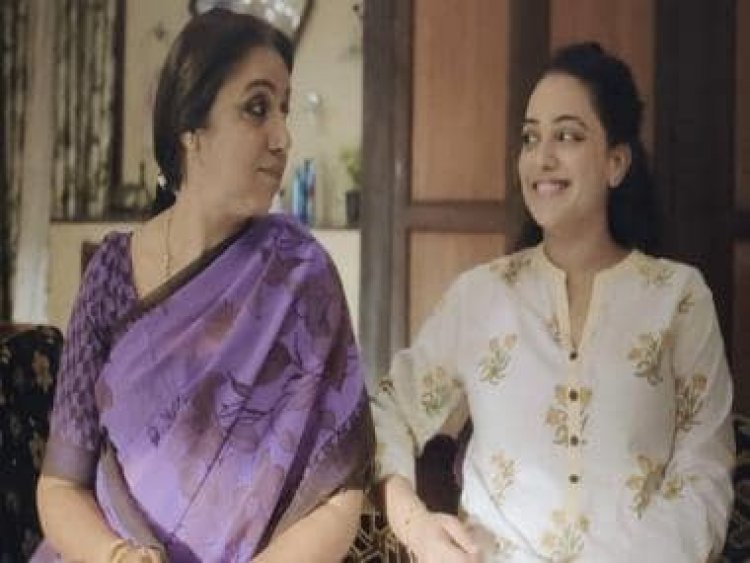Modern Love: Hyderabad’s segment on mother-daughter equation, rooted in reality with my mother
Modern Love: Hyderabad’s segment on mother-daughter equation, rooted in reality with my mother

The beauty of Amazon’s Modern Love Hyderabad series, both abroad and the iterations that have so far released in India, lies in how grounded and genuine the portrayal of relationships happen to be. The first season of the Hollywood iteration won hearts for the heartwarming depiction of individual struggles, their love and life. Unfortunately, Modern Love: Hyderabad iteration doesn’t manage to recreate this magic, not with all the episodes. However, there is one episode, the very first one, which spoke to me. It is about a mother-daughter relationship that is on the mend after a fallout over inter-community marriage. In fact, the performance and the writing of this episode was so good, that every episode that followed couldn’t dull its sheen.
I live with my mother on and off, and over the years, there have been quite a few quirks that I have noticed while trying to have a conversation with her. Here, I say trying because somehow, most of the conversations end up in an argument. These quirks that I believed were completely hers, have now taken form on screen. These conversations that Nouri Hussain has with her mother Meharunissa in the episode titled ‘My unlikely pandemic dream partner’ seemed to have been borrowed straight from my living room. Out of curiosity for what my mother’s opinion would be regarding this onscreen equation, I decided to invite her to watch it along with me. You see, we are a multilingual household and surprisingly my mother was up for this challenge.
To give context to the episode, Noori left home after her mother, a staunch and orthodox Sunni Muslim women opposed to Noori’s partner of choice, who hailed from a different community. The two have not been on speaking terms for years, six to be exact. Noori is currently divorced, and has had to go through a knee surgery. With no one to help her at home while she recuperated from the surgery, it is her mother who comes to the rescue. From the very first moment, it is clear that Meharunissa is not agreeable, and neither has she changed much over the years. The moment she meets Noori again after years, is less warm and more tenuous. Every comment from Noori sees a counter comment made by her mother, one that on the surface drives the chasm between them bigger. However, beyond her irksome observations lie years of memories that she continues to cherish, buried deep.
Meharunissa’s anger with her daughter is valid believed my mother, and Noori’s frustration is valid, I retorted. Even as we watched the episode, we began to pick apart why mothers make certain statements at inopportune moments. For instance, the first meal that Noori and her mother sit down to ends up in an argument when Noori points out that she has ordered butter chicken. She asks, “You still like it, don’t you?” This marks the years that have passed by in each other’s absence. To this, her mother says, “It would have been great if you had made dhal and rice.” It does seem strange doesn’t it, that the mother would make such a comment while her daughter has just had a knee surgery. Apparently, this statement has a deeper meaning, like the mother’s expectation from her daughter is not as grand as a butter chicken from a hotel, but a simple home cooked meal.
The conversation turns into an argument with both mother and daughter getting into a stare down contest. What would it be like to live a mother who finds faults with your every move during a lockdown? One whose politics you don’t agree with, one who is on the other spectrum of your belief system? These are hard question that is woven into the episode. Golden moments in the episode includes Meharunissa handing out biriyani to the auto driver Hussain, Noori yelling out that she can do it without her mother after she manages to change the dressing on her band aid by herself, and the final scene. The one with the haleem in a tiffin box in front of the Charminar.
The scene that I and my mother both agree as our favourite is the one where Meharunissa heads out to buy groceries on the day lock down gets announced. Noori asks her in a worried tone, “You are new to this neighbourhood, how are you going to manage?” To this, her mother responds, “I have borne pain for 22 hours to give birth to you, this is no big deal for me.” She doesn’t even turn to respond to her daughter. Noori wonders out loud, “How are these two things even related?” Both my mother and I burst out laughing because, this very question has been posed to her multiple times. What we deem unrelatable, is somehow related to them. When I asked my mother, why do mothers say such abstract things? Her response had been, “Because we have daughters such as you!” I guess the complex relationship between mother and daughter does have common idiosyncrasies.
Priyanka Sundar is a film journalist who covers films and series of different languages with special focus on identity and gender politics.
Read all the Latest News, Trending News, Cricket News, Bollywood News, India News and Entertainment News here. Follow us on Facebook, Twitter and Instagram.
What's Your Reaction?



























































